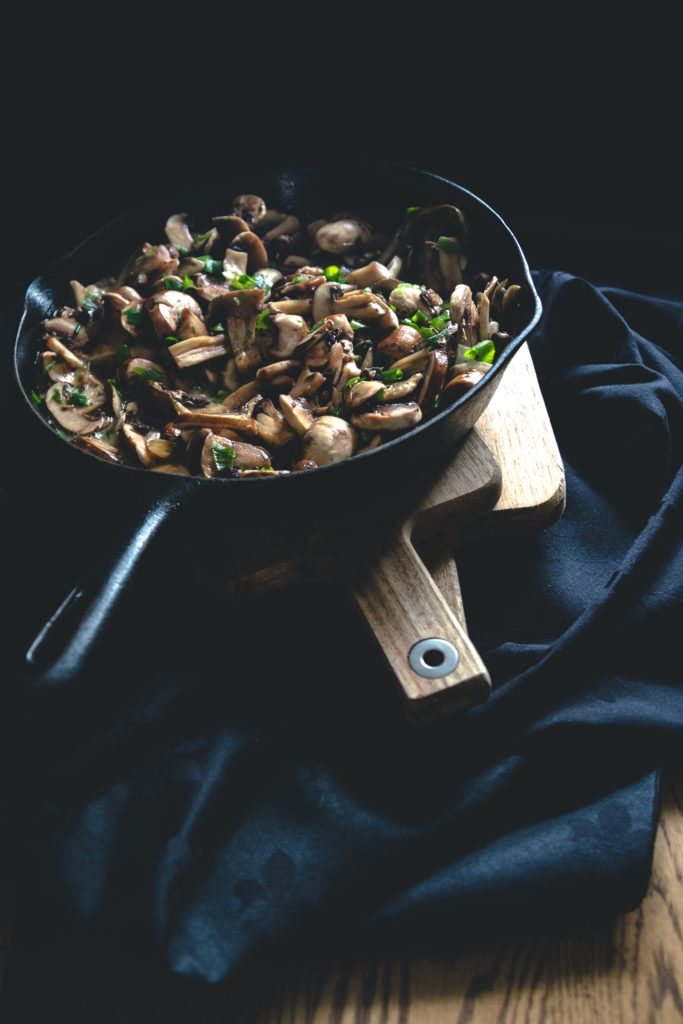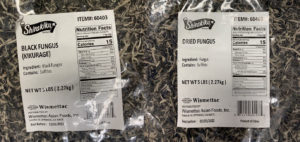All fields are required
Posted in Our Blog,Outbreaks & Recalls,Salmonella on September 24, 2020

Check your mushrooms people! The FDA, the CDC, and state and local partners are investigating an ongoing multistate outbreak of Salmonella Stanley infections linked to wood ear mushrooms imported by Wismettac Asian Foods, Inc. of Sanxta Fe Springs, CA. Here is everything we know about this Salmonella Mushroom Outbreak.
What Mushrooms are Affected?
Wood ear mushrooms are a dried mushroom, also commonly labelled or referred to as Kikurage, Dried Black Fungus, Dried Fungus, or Mu’er/Mu Er/Mu-Err. Mushrooms were distributed to restaurants in six packs of five-pound bags labeled as Shirakiku brand Black Fungus (Kikurage) with Universal Product Code (UPC) bar code 00074410604305, item #60403, imported from China.

Quick Facts
About the Salmonella Mushroom Outbreak
In interviews, ill people answered questions about the foods they ate and other exposures in the week before they became ill. According to the CDC, of 18 people with information, 16 (89%) reported eating ramen at a restaurant in the week before their illness started. Four illness clusters were identified at restaurants serving ramen in three states. Eight (89%) of the nine ill people linked to restaurant clusters reported eating wood ear mushrooms or ramen containing wood ear mushrooms in the week before their illness started.
As part of this investigation, the California Department of Public Health collected a sample of wood ear mushrooms, imported by Wismettac Asian Foods, Inc., from one of the restaurants where ill patients reported eating. This sample was reported positive for the presence of Salmonella. This sample is undergoing genetic testing, or whole genome sequencing, to determine if the Salmonella present in the sample has the same genetic fingerprint as the outbreak strain. More information will be provided as it becomes available.
Wismettac Asian Foods, Inc. acted quickly upon being notified of the positive test result and recalled all wood ear mushrooms within shelf life on September 23, 2020. This product was labeled as Shirakiku brand Black Fungus (Kikurage) with UPC Code 00074410604305, imported from China. Product was distributed in six packs of five-pound bags to restaurants in AR, CA, CO, CT, DE, DC, FL, GA, HI, IA, IL, IN, LA, MA, MD, MI, MN, MO, MS, NC, NV, NJ, NY, OH, OR, PA, SC, TN, TX, VA, WA, WI, and Canada.
FDA Recommendation
Wood ear mushrooms imported by Wismettac Asian Foods, Inc. were only sold to restaurants and were not available directly to consumers. Although these items have been recalled, concerned or high-risk individuals should check with their restaurant to confirm that any wood ear mushrooms that have been used or are being used are not part of this recall.
Restaurants should not sell or serve recalled wood ear mushrooms distributed by Wismettac Asian Foods, Inc. Additionally, restaurants that received recalled products should use extra vigilance in cleaning and sanitizing any surfaces that may have come in contact with recalled product, to reduce the risk of cross contamination.
Restaurants should discard and not sell or serve wood ear mushrooms if they cannot tell where they came from.
Recall Information
On September 23, 2020, Wismettac Asian Foods, Inc. recalled Shirakiku brand imported dried fungus. This product was labeled as Shirakiku brand Black Fungus (Kikurage) with UPC Code 00074410604305, imported from China. Product was distributed in six packs of five-pound bags to restaurants in AR, CA, CO, CT, DE, DC, FL, GA, HI, IA, IL, IN, LA, MA, MD, MI, MN, MO, MS, NC, NV, NJ, NY, OH, OR, PA, SC, TN, TX, VA, WA, and WI.
| Item Number | Item Description | Pack Size | UPC Code | Product Lot Code | Package Photo |
| #60403 | BLACK FUNGUS (KIKURAGE) 5LB | 5 LB | 00074410604035 | All Lots with Item #60403 on the package | See below |
General Food Safety Tips for Dried Mushrooms
Dried mushrooms, that have not been recalled due to potential contamination, should always be reconstituted using boiling water to kill any pathogens. This advice does not apply to recalled products, which should be thrown out.
Salmonella can present itself as many other common illnesses.
As with any food safety issue, it is important to contact your doctor in order to get the right treatment. Salmonella can go away by itself sometimes, but if you have symptoms that are described below, seek medical attention immediately:
Untreated illnesses can lead to worse conditions. Do not attempt to take care of this alone. Longer exposure could and will lead to complications if not treated.
One of the best ways to prevent the spread of Salmonella and other food related illnesses is to simply wash your hands. Here are a few tips from the CDC on when it is necessary to wash our hands:
Here are 5 steps to washing your hands:
Our mission is to help families who have been harmed by contaminated food or water. When corporations cause Salmonella food poisoning outbreaks, we use the law to hold them accountable. The Lange Law Firm is the only law firm in the nation solely focused on helping families in food poisoning lawsuits and contaminated water lawsuits.
If you got Salmonella food poisoning in this Salmonella Mushroom Outbreak and are interested in making a legal claim for compensation, we can help. Our Salmonella lawyer can help you pursue compensation for your Salmonella food poisoning. Call us for a free no obligation legal consultation at (833) 330-3663 or send us an e-mail here.
By: Candess Zona-Mendola